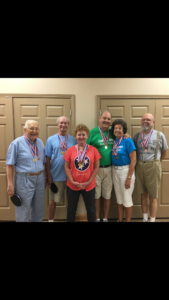 Five athletes stood in the lobby of the Cookeville Senior Citizens Center, shifting from one foot to another as the minutes ticked by.
Five athletes stood in the lobby of the Cookeville Senior Citizens Center, shifting from one foot to another as the minutes ticked by.
It was 8:20 on the morning of September 10. The UCHRA van that was supposed to pick us up and take us to Fairfield Glade was late. Twenty minutes late, to be exact. Would we be disqualified from the Senior Olympics district table tennis tournament for which we’d practiced so hard and so long?
Julie LaForest, assistant director at the senior center, was on the phone with UCHRA. She, too, was shifting from one foot to the other. The Cookeville van had broken down, they told her. They’d called McMinnville for a back-up. McMinnville???!!! We looked at each other in despair. How would we ever make it up the mountain in time for the tournament’s 9:00 start? I called Paul, our team captain, on his cell. He’d gone ahead of us on his own so he could stop at Hardee’s for breakfast and was already at the tournament site. Paul urged us to stay calm. He’d been competing in this tournament for years. They almost never started on time. He’d never heard of a team being disqualified.
“Relax,” he said, “and think about all the medals we’re going to win.”
The van finally pulled up at 8:35. With paddles and water bottles in hand, we scrambled aboard. The driver turned to look at us and smiled. “Where exactly in Cookeville are these Special Olympics being held?”
“It’s not Special Olympics,” I told him. “It’s Senior Olympics. And they’re in Crossville, not Cookeville. We only have 25 minutes to get there.” When he heard that, our driver put the pedal to the metal. Though we made it to the Fairfield Glad activity center in record time, the singles tournament had already begun. But as Paul had predicted, we hadn’t been disqualified.
We signed in, received our t-shirts and were directed to our assigned tables. There was nothing left to do but sit and study the competition.
The longer I watched, the more I worried. I knew from having played at the Cookeville senior center for the past two years not to judge other players’ abilities by their age or the number of knee, ankle or elbow braces they wore. My opponent in the singles final looked like she’d be easy to beat. Wrong. She won our first game handily. I beat her in the second, but lost the rubber game by a nose. Gold medal for her, silver for me.
Same story in the doubles final. Partner Joann and I lost the first game, won the second and lost the third. Silver again.
Then came the contest I’d hung all my hopes on. Mixed doubles. My partner was Paul, who’s almost 20 years older than me and about a thousand times as good a player. Our opponents were a gray-haired man who looked to be a little younger than Paul and a tall, slim woman who gripped her paddle upside down and hopped about like a grasshopper.
“All you have to do,” Paul whispered to me, “is get your serves in and play defense. I’ll take care of the rest.”
I wiped my sweaty palms on my t-shirt and nodded. And you know what? Paul’s plan worked. We crushed our opponents, in a very sportsmanlike way, of course. At last, the gold medal I’d been longing for was hung around my neck. I’m proud to say that all my teammates were weighed down with medals, too. Congratulations to Paul Barnhart, Cyle Dillon, Roger Haggard, Joann Jennings and Ernie Robertson for bringing table tennis gold, silver and bronze home to Cookeville.
And thanks to UCHRA driver Paul Parsley for a safe and fun trip to Fairfield Glade.
(September 22, 2019)